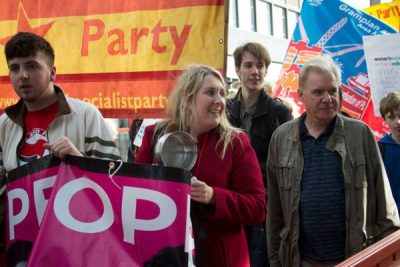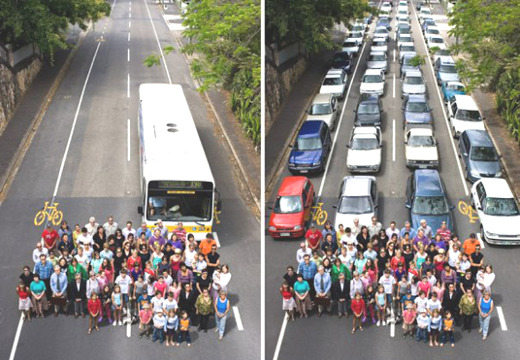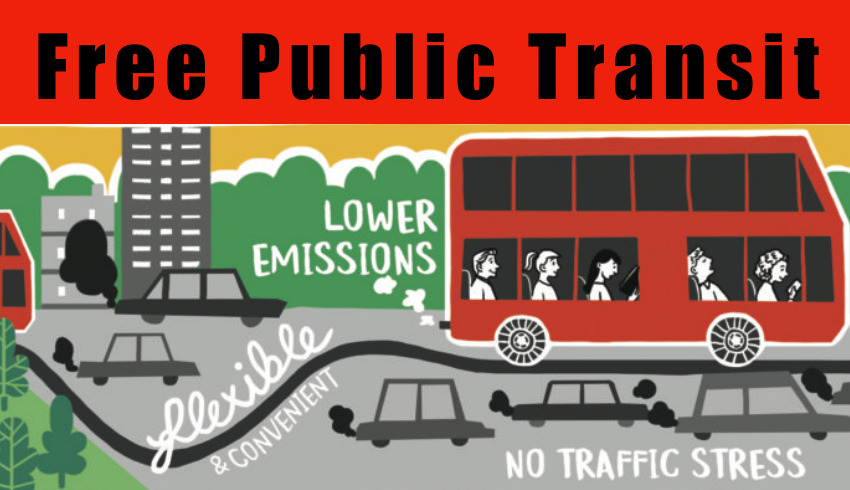The Case for Free Public Transport

The Scottish Socialist Party (SSP) is a proud advocate of a world-class, fare-free public transport system for Scotland.
Transport has undergone enormous changes in recent decades, both in Scotland and across the world. Some have been cyclical: in Scotland’s capital, trams were built, dismantled, and then reintroduced. In other areas, we have seen consistent trends like the steady deregulation and privatization of services, which has left Edinburgh as the sole city in Scotland with a municipal bus operator.
Rail fares across the UK have soared in comparison to those of our European neighbours, and Scottish transport contracts go out to tender in a farcical franchise system whereby public sector companies in other countries can bid for control while those in Scotland are effectively barred.
Scotland, the country which gave the world the pedal bicycle and the pneumatic tyre, now has a public transport network which is broadly unfit for purpose.
Massive changes have to be made to ensure that our public transport network is not only of a standard befitting the people of Scotland, but one that is adapted to our environmental and economic needs – challenging climate change while connecting communities and creating jobs through enhanced mobility.
“We call unashamedly for the integration of services – whether bus, rail, ferry, underground or tram – under publicly-owned and democratically-run operators.”
The Scottish Socialist Party is brave enough to identify these changes. We call unashamedly for the integration of services – whether bus, rail, ferry, underground or tram – under publicly-owned and democratically-run operators.
But the bravest step we can take as a nation to totally transform the way we travel is to support the international movement for free public transport and become pioneers of true freedom of movement for working class people.
There is a strong economic, social, and environmental case for adopting this policy throughout the country. There is also precedent from successful fare-free public transport schemes in parts of France, Germany, Belgium, and Estonia as well as far-flung cities in China and the United States. [Ed.: see wikipedia.org/wiki/Free_public_transport, and FreeTransitToronto.org.] We have evidence of the policy’s affordability and benefit.
I would put to sceptics that the prospect of free healthcare was once unthinkable. With the creation of NHS Scotland in 1948, hundreds of thousands of people gained access to essential medical care for the first time; the positive impact on Scottish society has been immense. The threat of privatization and marketization is a terrifying prospect for many.

Source: The Bullet
In the same spirit that the NHS was created over half a century ago, we can come together to build a public transport system that works for everyone. We can tackle poverty and social exclusion by extending access across urban and rural Scotland; this will be a financial relief for workers, parents and carers on low incomes, and make it even easier for families to switch from road trips to more eco-friendly bus rides and train journeys.
Building free transport links between rural communities even brings forward the possibility of economic regeneration in the Highlands, the Scottish Borders, and rural Fife, where greater interconnectivity and public investment could instigate growth and begin to reverse the exodus of young people from small towns and villages.
Free transport is neither easy nor cheap, nor can it alone transform Scotland. However, as part of a comprehensive socialist strategy, it can radically change the conditions of Scottish workers and help realise the full potential of totally under-utilized modes of transport.
The SSP has a good track record of winning others to our ideas. We championed free prescriptions in Holyrood and led the broad-based campaign to tackle poverty through the provision free school meals. We are committed supporters of universalism and pioneered many policies which were later taken up by the mainstream parties.
Ambition and Vision
Free transport is yet another distinctive SSP policy with ambition, vision and a firm footing in the needs and aspirations of Scotland. It is a policy whose implementation is not only possible, but increasingly necessary – addressing the pressing ecological crisis facing the world as well as the acute issues of poverty and exclusion at home.
These are among the reasons why free transport proposals are becoming more and more popular across Europe. Many in Scotland point to more affordable and efficient public transport systems in countries like Germany to highlight the shortcomings of our own – but to seek merely to emulate them is to limit our ambition, as proven by the spirited HVV umsonst! campaigners now pushing to scrap fares in Germany’s second-largest city.
In Sweden, anarchist initiative Planka.nu takes a particularly brazen approach to free transport campaigning by encouraging members of the public to leap ticket barriers, while operating a shared pool of funds to pay off any subsequent fines for its members.
Even in Scotland, understanding and appetite for the policy is slowly building. Scottish Green activists came close to persuading the rest of their party to back the progressive policy when it was revisited at their 2014 party conference.
It is often easier in politics to identify problems than solutions. For the SSP, free transport is a valuable idea that carries great potential as an innovative solution to an intersection of problems. For this reason, it is a policy that socialists will develop and promote further in the run-up to next year’s Scottish Parliament election.
*
Nine Points Arguing the Case for Free Public Transport
- Free fares would be the biggest single pro-environment policy enacted by any national government anywhere on the planet, dramatically slashing car use and CO2 emissions.
- Free fares would be the biggest anti-poverty, pro-social inclusion policy enacted in Scotland, or anywhere else in the UK. It is mainly people on low incomes who rely on public transport
- Free fares would cut the number of road accidents, reducing human suffering and relieving pressure on the NHS and the emergency services. The Scottish Executive estimates that road accidents cost £1.4-billion a year to the Scottish economy. (On an average day in Scotland there is one fatal road accident; another 8-10 involving serious injury; and 250-300 minor accidents. The vast majority involve cars.)
- Free fares would be help to reduce the levels of asthma and other respiratory illnesses, which have risen steeply in line with the expansion of road traffic
- Free fares would potentially increase the spending power of over a million workers by between £40 and £100 a month, boosting the overall economy.
- Free fares would increase business efficiency and productivity: the CBI estimates that traffic congestion costs business across Britain between £15 and £20-billion a year.
- Free fares would be a major tourist attraction, bringing hundreds of millions of pounds into the Scottish economy every year from increased visitor numbers. An increase in tourism of just 20 per cent would bring an extra £1-billion into the Scottish economy.
- Free fares would attract worldwide support, especially from the global environmental movement, and would bring pressure to bear on governments throughout Europe and the wider world to adopt a similar policy.
- Free fares would reduce Scotland’s reliance on depleting oil reserves; 67 per cent of all oil produced globally is used for transport.
An Idea Whose Time Has Come
In the early 1980s, the Greater London Council under Ken Livingston slashed fares and began to move towards free public transport. The policy was backed by 71 per cent of Londoners, but was destroyed by the Thatcher government and the Law Lords, backed by the car, haulage and oil industries.

Source: The Bullet
Within a year, ticket prices in London had doubled, car journeys had rocketed and there was an extra 6000 accidents on the city’s roads. A similar policy in South Yorkshire under David Blunkett was similarly torpedoed.
That was before global warming and the dangers of greenhouse gases became widely accepted by scientists. Twenty years on, our towns and cities are heading towards permanent gridlock and scientists are pressing the panic buttons. And the idea of free public transport is starting to make a comeback.
In the Belgian city of Hasselt, which covers an area double the size of Dundee, congestion was eliminated in the late 1980s after the introduction of a totally free public transport system. Within a year, bus passenger journeys rose by 870 per cent and have now increased by over 1000 per cent. In dismal contrast, the Scottish Executive has set a target for an annual increase of one per cent in bus journeys and two per cent in rail journeys.
The Danish government has commissioned a research group to examine the feasibility of a free public transport system (Copenhagen Post November 22, 2006).
The Melbourne Age newspaper, edited by Andrew Jaspan (a former editor of the Sunday Herald, The Scotsman and Scotland on Sunday) has called for state-wide free bus travel in Victoria (“A radical idea,” The Age, May 5, 2006).
Matthew Parrish, a Tory MP under Margaret Thatcher, who played a key role in destroying South Yorkshire’s cheap fares policy, now admits he was wrong and has called for London-wide free bus travel:
“I was wrong. I have changed my mind… Never mind the ideology, it just makes sense.” (“It’s big, it’s red, and it’s free – and it will save London,” The Times, May 8, 2003).
Visit Scotland (formerly the Scottish Tourist Board) recently published a report which set out the policy implications of global warming by 2015:
“In order to reduce dependency upon the car, we will see a number of measures to move people onto public transport. These will include free public transport for all in Scotland, whether this is buses or trains”. (Visit Scotland report: Tomorrow’s World, May 2006).

